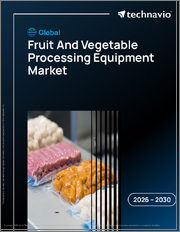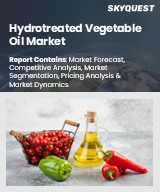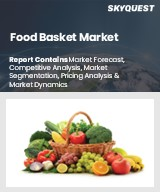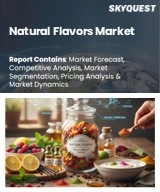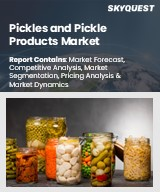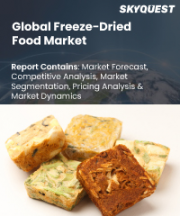
|
시장보고서
상품코드
1697087
야채 추출물 시장 - 성장, 전망, 경쟁 분석(2025-2033년)Vegetable Extracts Market - Growth, Future Prospects and Competitive Analysis, 2025 - 2033 |
||||||
야채 추출물 시장은 주로 추출 과정을 통해 얻은 농축 야채 물질의 생산과 유통에 관여합니다. 이 추출물은 뿌리, 잎, 열매, 씨앗을 포함한 야채의 다양한 부분에서 파생되며 소스 야채의 맛, 색상 또는 영양상의 이점을 캡처하는 데 사용됩니다. 야채 추출물은 음식, 의약품, 화장품, 영양 보조 식품에 널리 사용되며 귀중한 식물 화학 물질과 영양소의 농축 원천을 제공합니다. 야채 추출물 수요는 주로 다업종에 걸친 천연 소재와 식물 유래 제품에 대한 소비자의 관심이 높아짐에 따라 견인되고 있습니다. 음식 및 음료 분야에서 이러한 추출물은 인공 성분을 추가하지 않고 자연스럽게 맛을 향상시킬 수 있기 때문에 선호됩니다. 야채 추출물 시장은 연간 평균 성장률(CAGR) 6.5%를 나타낼 것으로 예측됩니다. 이 성장을 뒷받침하는 것은 소비자가 식품과 퍼스널케어 제품에 투명성과 천연 성분을 요구하는 클린 라벨 제품의 인기 증가입니다. 건강과 웰빙에 대한 세계 관심 증가, 특히 공중 보건 문제에 대한 관심 증가는 야채 추출물을 강화한 영양 보충제에 대한 수요를 더욱 밀어 올리고 있습니다.
천연 성분 및 기능성 성분에 대한 수요 증가
야채 추출물 시장의 주요 촉진요인은 식품, 음식 및 건강 제품의 천연 성분과 기능성 성분에 대한 소비자 수요가 증가하고 있습니다. 이 동향은 건강과 웰빙에 대한 의식 증가가 크게 영향을 받고 있으며 소비자는 합성 첨가물이 아닌 천연 첨가물을 사용한 제품을 요구하게 되었습니다. 예를 들어 식품업계에서는 인공적인 화학물질을 사용하지 않는 클린 라벨의 제품을 요구하는 소비자의 기호에 응하기 위해 야채 추출물이 천연의 풍미 조미료나 착색료로서 사용되는 케이스가 증가하고 있습니다. 영양 보조 식품 분야에서는 면역 지원과 항 염증 특성과 같은 특정 건강 효과를 제공하는 보충제에 대한 수요가 증가하고 있습니다. 비타민, 미네랄, 항산화 물질이 풍부한 야채 추출물은 농축된 영양소를 자연적인 형태로 섭취할 수 있기 때문에 이러한 용도에 최적입니다.
화장품·의약품업계 진출
야채 추출물 시장의 큰 기회는 화장품 및 의약품 업계에 진출에 있습니다. 많은 야채 추출물의 천연 항산화 특성은 안티 에이징 스킨 케어 제품의 우수한 후보가됩니다. 세계 인구의 고령화에 따라 피부 건강과 외형의 아름다움을 유지하기 위해 천연 화장품에 대한 수요가 증가하고 있습니다. 마찬가지로, 제약 업계에서는 합성 의약품보다 안전하고 부작용이 적은 것으로 알려진 식물 유래 치료법의 개발에 대한 관심이 높아지고 있습니다. 야채 추출물은 항염증 작용과 진통 작용과 같은 치료 특성으로 인해 이러한 제품의 주요 성분이 될 수 있습니다.
높은 생산 및 가공 비용
야채 추출물 시장의 주요 억제요인은 이러한 추출물의 생산과 가공과 관련된 높은 비용입니다. 추출 공정은 활성 화합물의 보존과 오염물질의 제거를 보장하기 위한 고급 기술과 장비를 필요로 하며 자본 집약적일 수 있습니다. 게다가 프리미엄 추출물에 필요한 고품질 유기농 야채를 조달하는 것은 특히 유기농 제품에 대한 수요가 지속적으로 증가하는 데 엄청난 비용이 듭니다. 이러한 요인으로 인해 최종 제품의 가격이 상승하고, 특히 비용에 민감한 지역에서는 시장 성장이 제한될 수 있습니다.
품질 관리 및 표준화의 과제
야채 추출물 시장이 직면하는 큰 도전 중 하나는 추출물의 일관된 품질과 표준화를 유지하는 것입니다. 야채 추출물의 품질은 재료 취급 품질, 사용되는 추출 방법, 취급 및 보관 조건에 따라 크게 다를 수 있습니다. 이러한 요인의 변동은 최종 제품의 효능과 안전성에 영향을 미칠 수 있으며, 이는 의약품 및 식품 산업에서 심각한 우려 사항입니다. 엄격한 품질 관리 프로세스와 업계 전반의 기준을 수립하는 것은 필수적이지만 공급업체, 제조업체, 규제 기관 등 다양한 이해 관계자간의 조정이 필요하기 때문에 과제가되고 있습니다.
형태별 시장 세분화
야채 추출물 시장에서 제품은 탈수 유형과 액체 페이스트 유형으로 구분됩니다. 탈수 추출물은 식품 조미료 및 영양 보조 식품을 포함한 다양한 분야에서 널리 사용되기 때문에 가장 높은 판매 점유율을 차지합니다. 그 인기는 보존 기간이 길고 운송 및 보관이 용이하기 때문에 소비자와 제조업체 모두에게 매우 실용적이기 때문입니다. 또한, 탈수 추출물은 생야채의 영양가를 많이 유지하기 때문에 건강 관련 제품으로 매력적입니다. 그러나 액체와 페이스트 형태가 가장 높은 CAGR을 나타낼 것으로 예상됩니다. 이 성장의 원동력이 되고 있는 것은 요리의 세계에서 보다 범용성이 높고, 곧바로 사용할 수 있는 형태에 수요가 높아지고 있는 것입니다. 이러한 형태는 레시피나 제제에의 임베디드이 용이하고, 탈수 형태에 필요한 준비를 하지 않고 풍미나 영양 성분을 강화할 수 있는 점이 평가되고 있습니다.
제품 유형별 시장 세분화
제품 유형별 시장 세분화에는 당근, 양파, 감자, 브로콜리, 콩, 완두콩, 양배추, 버섯, 토마토 및 기타 유형이 포함됩니다. 토마토는 높은 항산화 물질 함량과 다양한 요리 및 제품에 대한 범용성으로 인해 요리와 영양 보충제의 두 분야에서 널리 사용되기 때문에이 부문의 수익 창출에서 주도하고 있습니다. 토마토 추출물은 소스, 수프, 영양 보충제로 특히 인기가 있습니다. 한편, 버섯 추출물은 면역계의 서포트나 잠재적인 항암작용 등 그 건강효과에 대한 소비자의 관심이 높아지면서 CAGR이 가장 높아질 것으로 예측되고 있습니다. 버섯 추출물은 영양 보조 식품 및 건강 식품의 기능성 성분으로 인기가 높아지고 있지만, 이것은 웰빙과 예방 의료를 지원하는 제품을 요구하는 소비자의 동향을 반영하고 있습니다.
지역별 부문
2024년에는 북미가 야채 추출물 시장에서 가장 높은 매출 비율을 차지했습니다. 이는 천연 소재와 건강에 초점을 맞춘 제품에 대한 왕성한 소비자 수요, 식품의 안전성과 품질에 대한 종합적인 규제 지원, 확립된 식품 가공 산업이 원동력이 되고 있습니다. 그러나 2025년부터 2033년까지의 연평균 성장률(CAGR)은 아시아태평양이 가장 높을 것으로 예상됩니다. 이 성장 예측을 지원하는 것은 급속한 도시화, 소득 수준의 향상, 중간층 증가이며, 이들은 가공 식품과 건강 지향 식품에 대한 수요를 총체적으로 밀어 올리고 있습니다. 또한, 지역 요리에서 야채 추출물의 전통적인 사용과 건강과 웰빙의 새로운 동향이이 지역 시장 확대에 기여하고 있습니다.
경쟁 동향과 주요 기업
2024년 야채 추출물 시장 경쟁 구도는 Aarkay Food Products Ltd., Alpspure Lifesciences Pvt. Ltd., BK Dehy Foods, Del-Val Food Ingredients, Dohler GmbH, Foods & Inns Ltd., Ltd., Mevive International, 미쓰비시 상사, Mitthi Foods, Natural Dehydrated Vegetables Pvt.Ltd., 닛켄 후즈, Olam Group, Real Dehydrates Pvt.Ltd., Shakti Foods, Silva International, Tanixi Incorporation, Van Drun 제휴를 통해 제품 포트폴리오를 강화하고 세계의 발자취를 확대하는 데 폭넓게 주력했습니다. 제품의 품질, 특히 풍미, 영양 성분, 용도의 다양성을 혁신하고 향상시키기 위해 연구 개발에 많은 투자가 이루어졌습니다. 2025년부터 2033년까지 이 기업들은 지속가능성에 대한 노력을 더욱 강화하고, 탄소 실적를 줄이고 생산 공정의 생태적 프로파일을 개선할 것으로 예상됩니다. 시장을 선도하는 기업은 특히 아시아태평양과 아프리카를 중심으로 확대되는 식품 및 음료 산업이 큰 성장 기회를 가져오는 새로운 지리적 시장의 개척을 계속할 것으로 보입니다. 더 많은 영양소를 보유하고 추출물의 고순도화를 달성하기 위해 추출과 가공에서 첨단 기술의 통합도 중요한 전략적 초점이 될 것으로 보입니다.
목차
제1장 서문
- 보고서의 내용
- 보고서의 목적
- 대상자
- 주요 제공
- 시장 세분화
- 조사 방법
- Phase I - 2차 조사
- Phase II - 1차 조사
- Phase III - 전문가 패널 리뷰
- 전제조건
- 채용한 접근
제2장 주요 요약
제3장 야채 추출물 시장 : 경쟁 분석
- 주요 공급업체의 시장 포지셔닝
- 공급업체가 채용한 전략
- 주요 산업 전략
제4장 야채 추출물 시장 : 매크로 분석과 시장 역학
- 서론
- 세계의 야채 추출물 시장(2023-2033년)
- 시장 역학
- 시장 성장 촉진요인
- 시장 성장 억제요인
- 주요 과제
- 주요 기회
- 성장 촉진요인과 억제요인의 영향 분석
- See-Saw 분석
- Porter's Five Forces 모델
- 공급자의 협상력
- 바이어의 협상력
- 대체품의 위협
- 신규 참가업체의 위협
- 경쟁 기업간 경쟁 관계
- PESTEL 분석
- 정치적 요인
- 경제적 요인
- 기술적 요인
- 법적 요인
- 사회적 요인
제5장 야채 추출물 시장 : 형태별(2023-2033년)
- 시장 개요
- 성장·수익 분석(2024년vs2033년)
- 시장 세분화
- 탈수
- Minced 및 Chopped
- 분말 및 과립
- 플레이크
- 슬라이스 및 큐브
- 액체 및 페이스트
- 탈수
제6장 야채 추출물 시장 : 제품 유형별(2023-2033년)
- 시장 개요
- 성장·수익 분석(2024년vs2033년)
- 시장 세분화
- 당근
- 양파
- 감자
- 브로콜리
- 콩
- 완두콩
- 양배추
- 버섯
- 토마토
- 기타 유형
제7장 야채 추출물 시장 : 추출 방법별(2023-2033년)
- 시장 개요
- 성장·수익 분석(2024년vs2033년)
- 시장 세분화
- 공기 건조
- 스프레이 건조
- 동결 건조
- 드럼 건조
- 진공 건조
제8장 야채 추출 시장 : 최종 용도별(2023-2033년)
- 시장 개요
- 성장·수익 분석(2024년vs2033년)
- 시장 세분화
- 식품 제조업체
- 스낵 및 세이보리 제품
- 유아용 식품
- 수프
- 샐러드, 드레싱 및 소스
- 기타
- 푸드서비스 업계
- 소매
- 식품 제조업체
제9장 북미의 야채 추출물 시장(2023-2033년)
- 시장 개요
- 야채 추출물 시장 : 형태별(2023-2033년)
- 야채 추출물 시장 : 제품 유형별(2023-2033년)
- 야채 추출물 시장 : 추출 방법별(2023-2033년)
- 야채 추출물 시장 : 최종 용도별(2023-2033년)
- 야채 추출물 시장 : 지역별(2023-2033년)
- 북미
- 미국
- 캐나다
- 기타 북미
- 북미
제10장 영국 및 유럽 연합의 야채 추출물 시장(2023-2033년)
- 시장 개요
- 야채 추출물 시장 : 형태별(2023-2033년)
- 야채 추출물 시장 : 제품 유형별(2023-2033년)
- 야채 추출물 시장 : 추출 방법별(2023-2033년)
- 야채 추출물 시장 : 최종 용도별(2023-2033년)
- 야채 추출물 시장 : 지역별(2023-2033년)
- 영국 및 유럽 연합
- 영국
- 독일
- 스페인
- 이탈리아
- 프랑스
- 기타 유럽
- 영국 및 유럽 연합
제11장 아시아태평양의 야채 추출물 시장(2023-2033년)
- 시장 개요
- 야채 추출물 시장 : 형태별(2023-2033년)
- 야채 추출물 시장 : 제품 유형별(2023-2033년)
- 야채 추출물 시장 : 추출 방법별(2023-2033년)
- 야채 추출물 시장 : 최종 용도별(2023-2033년)
- 야채 추출물 시장 : 지역별(2023-2033년)
- 아시아태평양
- 중국
- 일본
- 인도
- 호주
- 한국
- 기타 아시아태평양
- 아시아태평양
제12장 라틴아메리카의 야채 추출물 시장(2023-2033년)
- 시장 개요
- 야채 추출물 시장 : 형태별(2023-2033년)
- 야채 추출물 시장 : 제품 유형별(2023-2033년)
- 야채 추출물 시장 : 추출 방법별(2023-2033년)
- 야채 추출물 시장 : 최종 용도별(2023-2033년)
- 야채 추출물 시장 : 지역별(2023-2033년)
- 라틴아메리카
- 브라질
- 멕시코
- 기타 라틴아메리카
- 라틴아메리카
제13장 중동 및 아프리카의 야채 추출물 시장(2023-2033년)
- 시장 개요
- 야채 추출물 시장 : 형태별(2023-2033년)
- 야채 추출물 시장 : 제품 유형별(2023-2033년)
- 야채 추출물 시장 : 추출 방법별(2023-2033년)
- 야채 추출물 시장 : 최종 용도별(2023-2033년)
- 야채 추출물 시장 : 지역별(2023-2033년)
- 중동 및 아프리카
- GCC
- 아프리카
- 기타 중동 및 아프리카
- 중동 및 아프리카
제14장 기업 프로파일
- Aarkay Food Products Ltd.
- Alpspure Lifesciences Pvt. Ltd.
- BK Dehy Foods
- Del-Val Food Ingredients
- Dohler GmbH
- Foods & Inns Ltd.
- Givaudan SA
- Ingredion
- KAN Phytochemicals Pvt. Ltd.
- Mevive International
- Mitsubishi Corporation
- Mitthi Foods
- Natural Dehydrated Vegetables Pvt. Ltd.
- Nikken Foods Co. Ltd.
- Olam Group
- Real Dehydrates Pvt. Ltd.
- Shakti Foods
- Silva International
- Tanisi Incorporation
- Van Drunen Farms
- Xinghua Lianfu Food Co. Ltd.
The vegetable extracts market involves the production and distribution of concentrated vegetable substances obtained primarily through the process of extraction. These extracts are derived from various parts of vegetables, including roots, leaves, fruits, and seeds, and are used to capture the flavors, colors, or nutritional benefits of the source vegetables. Vegetable extracts are widely utilized in the food and beverage industry, pharmaceuticals, cosmetics, and nutraceuticals, offering a concentrated source of valuable phytochemicals and nutrients. The demand for vegetable extracts is primarily driven by the growing consumer interest in natural and plant-based products across multiple industries. In the food and beverage sector, these extracts are favored for their ability to enhance flavor profiles naturally without the addition of artificial components. The vegetable extracts market is projected to grow at a Compound Annual Growth Rate (CAGR) of 6.5%. This growth is supported by the rising popularity of clean-label products, where consumers demand transparency and natural ingredients in their food and personal care products. The increasing global focus on health and wellness, particularly in light of public health issues, further drives the demand for dietary supplements enriched with vegetable extracts.
Increasing Demand for Natural and Functional Ingredients
The primary driver of the vegetable extracts market is the escalating consumer demand for natural and functional ingredients in foods, beverages, and health products. This trend is largely influenced by a growing awareness of health and wellness, which has prompted consumers to seek products with natural additives rather than synthetic alternatives. For instance, in the food industry, vegetable extracts are increasingly used as natural flavor enhancers and colorants to meet consumer preferences for clean-label products that are free from artificial chemicals. In the nutraceutical sector, the demand for supplements that offer specific health benefits, such as immune support or anti-inflammatory properties, is rising. Vegetable extracts, rich in vitamins, minerals, and antioxidants, are ideal for these applications, as they deliver concentrated nutrients in a natural form.
Expansion into Cosmetic and Pharmaceutical Industries
A significant opportunity for the vegetable extracts market lies in its expansion into the cosmetic and pharmaceutical industries. The natural antioxidant properties of many vegetable extracts make them excellent candidates for anti-aging skin care products. As the global population ages, the demand for natural cosmetic solutions that help maintain skin health and appearance is growing. Similarly, in the pharmaceutical industry, there is a rising interest in developing plant-based therapies that are perceived as safer and have fewer side effects than synthetic drugs. Vegetable extracts can be key ingredients in these products due to their therapeutic properties, including anti-inflammatory and analgesic effects.
High Costs of Production and Processing
A major restraint in the vegetable extracts market is the high costs associated with the production and processing of these extracts. The extraction processes require sophisticated technology and equipment to ensure that the active compounds are preserved and contaminants are eliminated, which can be capital-intensive. Additionally, the sourcing of high-quality, organic vegetables needed for premium extracts involves significant expense, particularly as demand for organic products continues to rise. These factors can increase the final product price, potentially limiting market growth, especially in cost-sensitive regions.
Quality Control and Standardization Challenges
One of the major challenges facing the vegetable extracts market is maintaining consistent quality and standardization of the extracts. The quality of vegetable extracts can vary significantly depending on the source material's quality, the extraction method used, and the handling and storage conditions. Variability in these factors can affect the efficacy and safety of the final products, which is a critical concern in the pharmaceutical and food industries. Establishing stringent quality control processes and industry-wide standards is essential but challenging, as it requires coordination across various stakeholders, including suppliers, manufacturers, and regulatory bodies.
Market Segmentation by Form
In the vegetable extracts market, the products are segmented into Dehydrated and Fluids & Paste forms. Dehydrated extracts hold the highest revenue share due to their widespread use across various sectors, including food seasoning and nutraceuticals. Their popularity stems from their long shelf life and ease of transport and storage, making them highly practical for both consumers and manufacturers. Additionally, dehydrated extracts preserve much of the nutritional value of fresh vegetables, making them attractive for health-related products. However, Fluids & Paste forms are expected to exhibit the highest CAGR. This growth is driven by the increasing demand for more versatile and ready-to-use formats in the culinary world, where these forms are valued for their ease of integration into recipes and formulations, enhancing flavors and nutrient content without the preparation required for dehydrated forms.
Market Segmentation by Product Type
The market segmentation by product type includes Carrot, Onions, Potatoes, Broccoli, Beans, Peas, Cabbage, Mushrooms, Tomatoes, and Other Types. Tomatoes lead in revenue generation within this segment, driven by their extensive use in both the culinary and nutraceutical sectors due to their high antioxidant content and versatility in various dishes and products. Tomato extracts are particularly popular in sauces, soups, and dietary supplements. On the other hand, Mushroom extracts are projected to experience the highest CAGR, spurred by growing consumer interest in their health benefits, including immune system support and potential anti-cancer properties. Mushroom extracts are becoming increasingly popular in dietary supplements and as functional ingredients in health foods, reflecting broader consumer trends towards products that support wellness and preventive health care.
Geographic Segment
In 2024, the North American region accounted for the highest revenue percent in the vegetable extracts market, driven by robust consumer demand for natural and health-focused products, comprehensive regulatory support for food safety and quality, and a well-established food processing industry. However, the Asia Pacific region is expected to experience the highest Compound Annual Growth Rate (CAGR) from 2025 to 2033. This growth projection is supported by rapid urbanization, increasing income levels, and a growing middle class, which are collectively boosting demand for processed and health-centric food products. Additionally, traditional uses of vegetable extracts in regional cuisines and emerging trends in health and wellness are contributing to market expansion in this region.
Competitive Trends and Top Players
The competitive landscape in the vegetable extracts market in 2024 featured active participation from key players such as Aarkay Food Products Ltd., Alpspure Lifesciences Pvt. Ltd., B.K. Dehy Foods, Del-Val Food Ingredients, Dohler GmbH, Foods & Inns Ltd., Givaudan S.A., Ingredion, KAN Phytochemicals Pvt. Ltd., Mevive International, Mitsubishi Corporation, Mitthi Foods, Natural Dehydrated Vegetables Pvt. Ltd., Nikken Foods Co., Ltd., Olam Group, Real Dehydrates Pvt. Ltd., Shakti Foods, Silva International, Tanisi Incorporation, Van Drunen Farms, and Xinghua Lianfu Food Co., Ltd. These companies focused extensively on enhancing their product portfolios and expanding their global footprints through strategic mergers, acquisitions, and collaborations. Significant investments were made in research and development to innovate and improve product quality, particularly in terms of flavor, nutritional content, and application versatility. From 2025 to 2033, these companies are expected to further intensify their efforts in sustainability, targeting reductions in carbon footprints and improving the ecological profiles of their production processes. Market leaders will likely continue to explore new geographical markets, particularly in Asia Pacific and Africa, where the expanding food and beverage industries present substantial opportunities for growth. Integration of advanced technologies in extraction and processing to retain more nutrients and achieve higher purity in extracts will also be a key strategic focus.
Historical & Forecast Period
This study report represents an analysis of each segment from 2023 to 2033 considering 2024 as the base year. Compounded Annual Growth Rate (CAGR) for each of the respective segments estimated for the forecast period of 2025 to 2033.
The current report comprises quantitative market estimations for each micro market for every geographical region and qualitative market analysis such as micro and macro environment analysis, market trends, competitive intelligence, segment analysis, porters five force model, top winning strategies, top investment markets, emerging trends & technological analysis, case studies, strategic conclusions and recommendations and other key market insights.
Research Methodology
The complete research study was conducted in three phases, namely: secondary research, primary research, and expert panel review. The key data points that enable the estimation of Vegetable Extracts market are as follows:
Research and development budgets of manufacturers and government spending
Revenues of key companies in the market segment
Number of end users & consumption volume, price, and value.
Geographical revenues generated by countries considered in the report
Micro and macro environment factors that are currently influencing the Vegetable Extracts market and their expected impact during the forecast period.
Market forecast was performed through proprietary software that analyzes various qualitative and quantitative factors. Growth rate and CAGR were estimated through intensive secondary and primary research. Data triangulation across various data points provides accuracy across various analyzed market segments in the report. Application of both top-down and bottom-up approach for validation of market estimation assures logical, methodical, and mathematical consistency of the quantitative data.
Market Segmentation
- Form
- Dehydrated
- Minced & Chopped
- Powder & Granules
- Flakes
- Slice & Cubes
- Fluids & Paste
- Product Type
- Carrot
- Onions
- Potatoes
- Broccoli
- Beans
- Peas
- Cabbage
- Mushrooms
- Tomatoes
- Other Types
- Extraction Method
- Air Drying
- Spray Drying
- Freeze Drying
- Drum Drying
- Vacuum Drying
- End Use
- Food Manufacturers
- Snacks & Savory Products
- Infant Foods
- Soups
- Salads, Dressings & Sauces
- Others
- Foodservice Industry
- Retail
- Region Segment (2023-2033; US$ Million)
- North America
- U.S.
- Canada
- Rest of North America
- UK and European Union
- UK
- Germany
- Spain
- Italy
- France
- Rest of Europe
- Asia Pacific
- China
- Japan
- India
- Australia
- South Korea
- Rest of Asia Pacific
- Latin America
- Brazil
- Mexico
- Rest of Latin America
- Middle East and Africa
- GCC
- Africa
- Rest of Middle East and Africa
Key questions answered in this report
- What are the key micro and macro environmental factors that are impacting the growth of Vegetable Extracts market?
- What are the key investment pockets concerning product segments and geographies currently and during the forecast period?
- Estimated forecast and market projections up to 2033.
- Which segment accounts for the fastest CAGR during the forecast period?
- Which market segment holds a larger market share and why?
- Are low and middle-income economies investing in the Vegetable Extracts market?
- Which is the largest regional market for Vegetable Extracts market?
- What are the market trends and dynamics in emerging markets such as Asia Pacific, Latin America, and Middle East & Africa?
- Which are the key trends driving Vegetable Extracts market growth?
- Who are the key competitors and what are their key strategies to enhance their market presence in the Vegetable Extracts market worldwide?
Table of Contents
1. Preface
- 1.1. Report Description
- 1.1.1. Purpose of the Report
- 1.1.2. Target Audience
- 1.1.3. Key Offerings
- 1.2. Market Segmentation
- 1.3. Research Methodology
- 1.3.1. Phase I - Secondary Research
- 1.3.2. Phase II - Primary Research
- 1.3.3. Phase III - Expert Panel Review
- 1.3.4. Assumptions
- 1.3.5. Approach Adopted
2. Executive Summary
- 2.1. Market Snapshot: Global Vegetable Extracts Market
- 2.2. Global Vegetable Extracts Market, By Form, 2024 (US$ Million)
- 2.3. Global Vegetable Extracts Market, By Product Type, 2024 (US$ Million)
- 2.4. Global Vegetable Extracts Market, By Extraction Method, 2024 (US$ Million)
- 2.5. Global Vegetable Extracts Market, By End Use, 2024 (US$ Million)
- 2.6. Global Vegetable Extracts Market, By Geography, 2024 (US$ Million)
- 2.7. Attractive Investment Proposition by Geography, 2024
3. Vegetable Extracts Market: Competitive Analysis
- 3.1. Market Positioning of Key Vegetable Extracts Market Vendors
- 3.2. Strategies Adopted by Vegetable Extracts Market Vendors
- 3.3. Key Industry Strategies
4. Vegetable Extracts Market: Macro Analysis & Market Dynamics
- 4.1. Introduction
- 4.2. Global Vegetable Extracts Market Value, 2023 - 2033, (US$ Million)
- 4.3. Market Dynamics
- 4.3.1. Market Drivers
- 4.3.2. Market Restraints
- 4.3.3. Key Challenges
- 4.3.4. Key Opportunities
- 4.4. Impact Analysis of Drivers and Restraints
- 4.5. See-Saw Analysis
- 4.6. Porter's Five Force Model
- 4.6.1. Supplier Power
- 4.6.2. Buyer Power
- 4.6.3. Threat Of Substitutes
- 4.6.4. Threat Of New Entrants
- 4.6.5. Competitive Rivalry
- 4.7. PESTEL Analysis
- 4.7.1. Political Landscape
- 4.7.2. Economic Landscape
- 4.7.3. Technology Landscape
- 4.7.4. Legal Landscape
- 4.7.5. Social Landscape
5. Vegetable Extracts Market: By Form, 2023-2033, USD (Million)
- 5.1. Market Overview
- 5.2. Growth & Revenue Analysis: 2024 Versus 2033
- 5.3. Market Segmentation
- 5.3.1. Dehydrated
- 5.3.1.1. Minced & Chopped
- 5.3.1.2. Powder & Granules
- 5.3.1.3. Flakes
- 5.3.1.4. Slice & Cubes
- 5.3.2. Fluids & Paste
- 5.3.1. Dehydrated
6. Vegetable Extracts Market: By Product Type, 2023-2033, USD (Million)
- 6.1. Market Overview
- 6.2. Growth & Revenue Analysis: 2024 Versus 2033
- 6.3. Market Segmentation
- 6.3.1. Carrot
- 6.3.2. Onions
- 6.3.3. Potatoes
- 6.3.4. Broccoli
- 6.3.5. Beans
- 6.3.6. Peas
- 6.3.7. Cabbage
- 6.3.8. Mushrooms
- 6.3.9. Tomatoes
- 6.3.10. Other Types
7. Vegetable Extracts Market: By Extraction Method, 2023-2033, USD (Million)
- 7.1. Market Overview
- 7.2. Growth & Revenue Analysis: 2024 Versus 2033
- 7.3. Market Segmentation
- 7.3.1. Air Drying
- 7.3.2. Spray Drying
- 7.3.3. Freeze Drying
- 7.3.4. Drum Drying
- 7.3.5. Vacuum Drying
8. Vegetable Extracts Market: By End Use, 2023-2033, USD (Million)
- 8.1. Market Overview
- 8.2. Growth & Revenue Analysis: 2024 Versus 2033
- 8.3. Market Segmentation
- 8.3.1. Food Manufacturers
- 8.3.1.1. Snacks & Savory Products
- 8.3.1.2. Infant Foods
- 8.3.1.3. Soups
- 8.3.1.4. Salads, Dressings & Sauces
- 8.3.1.5. Others
- 8.3.2. Foodservice Industry
- 8.3.3. Retail
- 8.3.1. Food Manufacturers
9. North America Vegetable Extracts Market, 2023-2033, USD (Million)
- 9.1. Market Overview
- 9.2. Vegetable Extracts Market: By Form, 2023-2033, USD (Million)
- 9.3. Vegetable Extracts Market: By Product Type, 2023-2033, USD (Million)
- 9.4. Vegetable Extracts Market: By Extraction Method, 2023-2033, USD (Million)
- 9.5. Vegetable Extracts Market: By End Use, 2023-2033, USD (Million)
- 9.6.Vegetable Extracts Market: By Region, 2023-2033, USD (Million)
- 9.6.1.North America
- 9.6.1.1. U.S.
- 9.6.1.1.1. Vegetable Extracts Market: By Form, 2023-2033, USD (Million)
- 9.6.1.1.2. Vegetable Extracts Market: By Product Type, 2023-2033, USD (Million)
- 9.6.1.1.3. Vegetable Extracts Market: By Extraction Method, 2023-2033, USD (Million)
- 9.6.1.1.4. Vegetable Extracts Market: By End Use, 2023-2033, USD (Million)
- 9.6.1.2. Canada
- 9.6.1.2.1. Vegetable Extracts Market: By Form, 2023-2033, USD (Million)
- 9.6.1.2.2. Vegetable Extracts Market: By Product Type, 2023-2033, USD (Million)
- 9.6.1.2.3. Vegetable Extracts Market: By Extraction Method, 2023-2033, USD (Million)
- 9.6.1.2.4. Vegetable Extracts Market: By End Use, 2023-2033, USD (Million)
- 9.6.1.3. Rest of North America
- 9.6.1.3.1. Vegetable Extracts Market: By Form, 2023-2033, USD (Million)
- 9.6.1.3.2. Vegetable Extracts Market: By Product Type, 2023-2033, USD (Million)
- 9.6.1.3.3. Vegetable Extracts Market: By Extraction Method, 2023-2033, USD (Million)
- 9.6.1.3.4. Vegetable Extracts Market: By End Use, 2023-2033, USD (Million)
- 9.6.1.1. U.S.
- 9.6.1.North America
10. UK and European Union Vegetable Extracts Market, 2023-2033, USD (Million)
- 10.1. Market Overview
- 10.2. Vegetable Extracts Market: By Form, 2023-2033, USD (Million)
- 10.3. Vegetable Extracts Market: By Product Type, 2023-2033, USD (Million)
- 10.4. Vegetable Extracts Market: By Extraction Method, 2023-2033, USD (Million)
- 10.5. Vegetable Extracts Market: By End Use, 2023-2033, USD (Million)
- 10.6.Vegetable Extracts Market: By Region, 2023-2033, USD (Million)
- 10.6.1.UK and European Union
- 10.6.1.1. UK
- 10.6.1.1.1. Vegetable Extracts Market: By Form, 2023-2033, USD (Million)
- 10.6.1.1.2. Vegetable Extracts Market: By Product Type, 2023-2033, USD (Million)
- 10.6.1.1.3. Vegetable Extracts Market: By Extraction Method, 2023-2033, USD (Million)
- 10.6.1.1.4. Vegetable Extracts Market: By End Use, 2023-2033, USD (Million)
- 10.6.1.2. Germany
- 10.6.1.2.1. Vegetable Extracts Market: By Form, 2023-2033, USD (Million)
- 10.6.1.2.2. Vegetable Extracts Market: By Product Type, 2023-2033, USD (Million)
- 10.6.1.2.3. Vegetable Extracts Market: By Extraction Method, 2023-2033, USD (Million)
- 10.6.1.2.4. Vegetable Extracts Market: By End Use, 2023-2033, USD (Million)
- 10.6.1.3. Spain
- 10.6.1.3.1. Vegetable Extracts Market: By Form, 2023-2033, USD (Million)
- 10.6.1.3.2. Vegetable Extracts Market: By Product Type, 2023-2033, USD (Million)
- 10.6.1.3.3. Vegetable Extracts Market: By Extraction Method, 2023-2033, USD (Million)
- 10.6.1.3.4. Vegetable Extracts Market: By End Use, 2023-2033, USD (Million)
- 10.6.1.4. Italy
- 10.6.1.4.1. Vegetable Extracts Market: By Form, 2023-2033, USD (Million)
- 10.6.1.4.2. Vegetable Extracts Market: By Product Type, 2023-2033, USD (Million)
- 10.6.1.4.3. Vegetable Extracts Market: By Extraction Method, 2023-2033, USD (Million)
- 10.6.1.4.4. Vegetable Extracts Market: By End Use, 2023-2033, USD (Million)
- 10.6.1.5. France
- 10.6.1.5.1. Vegetable Extracts Market: By Form, 2023-2033, USD (Million)
- 10.6.1.5.2. Vegetable Extracts Market: By Product Type, 2023-2033, USD (Million)
- 10.6.1.5.3. Vegetable Extracts Market: By Extraction Method, 2023-2033, USD (Million)
- 10.6.1.5.4. Vegetable Extracts Market: By End Use, 2023-2033, USD (Million)
- 10.6.1.6. Rest of Europe
- 10.6.1.6.1. Vegetable Extracts Market: By Form, 2023-2033, USD (Million)
- 10.6.1.6.2. Vegetable Extracts Market: By Product Type, 2023-2033, USD (Million)
- 10.6.1.6.3. Vegetable Extracts Market: By Extraction Method, 2023-2033, USD (Million)
- 10.6.1.6.4. Vegetable Extracts Market: By End Use, 2023-2033, USD (Million)
- 10.6.1.1. UK
- 10.6.1.UK and European Union
11. Asia Pacific Vegetable Extracts Market, 2023-2033, USD (Million)
- 11.1. Market Overview
- 11.2. Vegetable Extracts Market: By Form, 2023-2033, USD (Million)
- 11.3. Vegetable Extracts Market: By Product Type, 2023-2033, USD (Million)
- 11.4. Vegetable Extracts Market: By Extraction Method, 2023-2033, USD (Million)
- 11.5. Vegetable Extracts Market: By End Use, 2023-2033, USD (Million)
- 11.6.Vegetable Extracts Market: By Region, 2023-2033, USD (Million)
- 11.6.1.Asia Pacific
- 11.6.1.1. China
- 11.6.1.1.1. Vegetable Extracts Market: By Form, 2023-2033, USD (Million)
- 11.6.1.1.2. Vegetable Extracts Market: By Product Type, 2023-2033, USD (Million)
- 11.6.1.1.3. Vegetable Extracts Market: By Extraction Method, 2023-2033, USD (Million)
- 11.6.1.1.4. Vegetable Extracts Market: By End Use, 2023-2033, USD (Million)
- 11.6.1.2. Japan
- 11.6.1.2.1. Vegetable Extracts Market: By Form, 2023-2033, USD (Million)
- 11.6.1.2.2. Vegetable Extracts Market: By Product Type, 2023-2033, USD (Million)
- 11.6.1.2.3. Vegetable Extracts Market: By Extraction Method, 2023-2033, USD (Million)
- 11.6.1.2.4. Vegetable Extracts Market: By End Use, 2023-2033, USD (Million)
- 11.6.1.3. India
- 11.6.1.3.1. Vegetable Extracts Market: By Form, 2023-2033, USD (Million)
- 11.6.1.3.2. Vegetable Extracts Market: By Product Type, 2023-2033, USD (Million)
- 11.6.1.3.3. Vegetable Extracts Market: By Extraction Method, 2023-2033, USD (Million)
- 11.6.1.3.4. Vegetable Extracts Market: By End Use, 2023-2033, USD (Million)
- 11.6.1.4. Australia
- 11.6.1.4.1. Vegetable Extracts Market: By Form, 2023-2033, USD (Million)
- 11.6.1.4.2. Vegetable Extracts Market: By Product Type, 2023-2033, USD (Million)
- 11.6.1.4.3. Vegetable Extracts Market: By Extraction Method, 2023-2033, USD (Million)
- 11.6.1.4.4. Vegetable Extracts Market: By End Use, 2023-2033, USD (Million)
- 11.6.1.5. South Korea
- 11.6.1.5.1. Vegetable Extracts Market: By Form, 2023-2033, USD (Million)
- 11.6.1.5.2. Vegetable Extracts Market: By Product Type, 2023-2033, USD (Million)
- 11.6.1.5.3. Vegetable Extracts Market: By Extraction Method, 2023-2033, USD (Million)
- 11.6.1.5.4. Vegetable Extracts Market: By End Use, 2023-2033, USD (Million)
- 11.6.1.6. Rest of Asia Pacific
- 11.6.1.6.1. Vegetable Extracts Market: By Form, 2023-2033, USD (Million)
- 11.6.1.6.2. Vegetable Extracts Market: By Product Type, 2023-2033, USD (Million)
- 11.6.1.6.3. Vegetable Extracts Market: By Extraction Method, 2023-2033, USD (Million)
- 11.6.1.6.4. Vegetable Extracts Market: By End Use, 2023-2033, USD (Million)
- 11.6.1.1. China
- 11.6.1.Asia Pacific
12. Latin America Vegetable Extracts Market, 2023-2033, USD (Million)
- 12.1. Market Overview
- 12.2. Vegetable Extracts Market: By Form, 2023-2033, USD (Million)
- 12.3. Vegetable Extracts Market: By Product Type, 2023-2033, USD (Million)
- 12.4. Vegetable Extracts Market: By Extraction Method, 2023-2033, USD (Million)
- 12.5. Vegetable Extracts Market: By End Use, 2023-2033, USD (Million)
- 12.6.Vegetable Extracts Market: By Region, 2023-2033, USD (Million)
- 12.6.1.Latin America
- 12.6.1.1. Brazil
- 12.6.1.1.1. Vegetable Extracts Market: By Form, 2023-2033, USD (Million)
- 12.6.1.1.2. Vegetable Extracts Market: By Product Type, 2023-2033, USD (Million)
- 12.6.1.1.3. Vegetable Extracts Market: By Extraction Method, 2023-2033, USD (Million)
- 12.6.1.1.4. Vegetable Extracts Market: By End Use, 2023-2033, USD (Million)
- 12.6.1.2. Mexico
- 12.6.1.2.1. Vegetable Extracts Market: By Form, 2023-2033, USD (Million)
- 12.6.1.2.2. Vegetable Extracts Market: By Product Type, 2023-2033, USD (Million)
- 12.6.1.2.3. Vegetable Extracts Market: By Extraction Method, 2023-2033, USD (Million)
- 12.6.1.2.4. Vegetable Extracts Market: By End Use, 2023-2033, USD (Million)
- 12.6.1.3. Rest of Latin America
- 12.6.1.3.1. Vegetable Extracts Market: By Form, 2023-2033, USD (Million)
- 12.6.1.3.2. Vegetable Extracts Market: By Product Type, 2023-2033, USD (Million)
- 12.6.1.3.3. Vegetable Extracts Market: By Extraction Method, 2023-2033, USD (Million)
- 12.6.1.3.4. Vegetable Extracts Market: By End Use, 2023-2033, USD (Million)
- 12.6.1.1. Brazil
- 12.6.1.Latin America
13. Middle East and Africa Vegetable Extracts Market, 2023-2033, USD (Million)
- 13.1. Market Overview
- 13.2. Vegetable Extracts Market: By Form, 2023-2033, USD (Million)
- 13.3. Vegetable Extracts Market: By Product Type, 2023-2033, USD (Million)
- 13.4. Vegetable Extracts Market: By Extraction Method, 2023-2033, USD (Million)
- 13.5. Vegetable Extracts Market: By End Use, 2023-2033, USD (Million)
- 13.6.Vegetable Extracts Market: By Region, 2023-2033, USD (Million)
- 13.6.1.Middle East and Africa
- 13.6.1.1. GCC
- 13.6.1.1.1. Vegetable Extracts Market: By Form, 2023-2033, USD (Million)
- 13.6.1.1.2. Vegetable Extracts Market: By Product Type, 2023-2033, USD (Million)
- 13.6.1.1.3. Vegetable Extracts Market: By Extraction Method, 2023-2033, USD (Million)
- 13.6.1.1.4. Vegetable Extracts Market: By End Use, 2023-2033, USD (Million)
- 13.6.1.2. Africa
- 13.6.1.2.1. Vegetable Extracts Market: By Form, 2023-2033, USD (Million)
- 13.6.1.2.2. Vegetable Extracts Market: By Product Type, 2023-2033, USD (Million)
- 13.6.1.2.3. Vegetable Extracts Market: By Extraction Method, 2023-2033, USD (Million)
- 13.6.1.2.4. Vegetable Extracts Market: By End Use, 2023-2033, USD (Million)
- 13.6.1.3. Rest of Middle East and Africa
- 13.6.1.3.1. Vegetable Extracts Market: By Form, 2023-2033, USD (Million)
- 13.6.1.3.2. Vegetable Extracts Market: By Product Type, 2023-2033, USD (Million)
- 13.6.1.3.3. Vegetable Extracts Market: By Extraction Method, 2023-2033, USD (Million)
- 13.6.1.3.4. Vegetable Extracts Market: By End Use, 2023-2033, USD (Million)
- 13.6.1.1. GCC
- 13.6.1.Middle East and Africa
14. Company Profile
- 14.1. Aarkay Food Products Ltd.
- 14.1.1. Company Overview
- 14.1.2. Financial Performance
- 14.1.3. Product Portfolio
- 14.1.4. Strategic Initiatives
- 14.2. Alpspure Lifesciences Pvt. Ltd.
- 14.2.1. Company Overview
- 14.2.2. Financial Performance
- 14.2.3. Product Portfolio
- 14.2.4. Strategic Initiatives
- 14.3. B.K. Dehy Foods
- 14.3.1. Company Overview
- 14.3.2. Financial Performance
- 14.3.3. Product Portfolio
- 14.3.4. Strategic Initiatives
- 14.4. Del-Val Food Ingredients
- 14.4.1. Company Overview
- 14.4.2. Financial Performance
- 14.4.3. Product Portfolio
- 14.4.4. Strategic Initiatives
- 14.5. Dohler GmbH
- 14.5.1. Company Overview
- 14.5.2. Financial Performance
- 14.5.3. Product Portfolio
- 14.5.4. Strategic Initiatives
- 14.6. Foods & Inns Ltd.
- 14.6.1. Company Overview
- 14.6.2. Financial Performance
- 14.6.3. Product Portfolio
- 14.6.4. Strategic Initiatives
- 14.7. Givaudan S.A.
- 14.7.1. Company Overview
- 14.7.2. Financial Performance
- 14.7.3. Product Portfolio
- 14.7.4. Strategic Initiatives
- 14.8. Ingredion
- 14.8.1. Company Overview
- 14.8.2. Financial Performance
- 14.8.3. Product Portfolio
- 14.8.4. Strategic Initiatives
- 14.9. KAN Phytochemicals Pvt. Ltd.
- 14.9.1. Company Overview
- 14.9.2. Financial Performance
- 14.9.3. Product Portfolio
- 14.9.4. Strategic Initiatives
- 14.10. Mevive International
- 14.10.1. Company Overview
- 14.10.2. Financial Performance
- 14.10.3. Product Portfolio
- 14.10.4. Strategic Initiatives
- 14.11. Mitsubishi Corporation
- 14.11.1. Company Overview
- 14.11.2. Financial Performance
- 14.11.3. Product Portfolio
- 14.11.4. Strategic Initiatives
- 14.12. Mitthi Foods
- 14.12.1. Company Overview
- 14.12.2. Financial Performance
- 14.12.3. Product Portfolio
- 14.12.4. Strategic Initiatives
- 14.13. Natural Dehydrated Vegetables Pvt. Ltd.
- 14.13.1. Company Overview
- 14.13.2. Financial Performance
- 14.13.3. Product Portfolio
- 14.13.4. Strategic Initiatives
- 14.14. Nikken Foods Co., Ltd.
- 14.14.1. Company Overview
- 14.14.2. Financial Performance
- 14.14.3. Product Portfolio
- 14.14.4. Strategic Initiatives
- 14.15. Olam Group
- 14.15.1. Company Overview
- 14.15.2. Financial Performance
- 14.15.3. Product Portfolio
- 14.15.4. Strategic Initiatives
- 14.16. Real Dehydrates Pvt. Ltd.
- 14.16.1. Company Overview
- 14.16.2. Financial Performance
- 14.16.3. Product Portfolio
- 14.16.4. Strategic Initiatives
- 14.17. Shakti Foods
- 14.17.1. Company Overview
- 14.17.2. Financial Performance
- 14.17.3. Product Portfolio
- 14.17.4. Strategic Initiatives
- 14.18. Silva International
- 14.18.1. Company Overview
- 14.18.2. Financial Performance
- 14.18.3. Product Portfolio
- 14.18.4. Strategic Initiatives
- 14.19. Tanisi Incorporation
- 14.19.1. Company Overview
- 14.19.2. Financial Performance
- 14.19.3. Product Portfolio
- 14.19.4. Strategic Initiatives
- 14.20. Van Drunen Farms
- 14.20.1. Company Overview
- 14.20.2. Financial Performance
- 14.20.3. Product Portfolio
- 14.20.4. Strategic Initiatives
- 14.21. Xinghua Lianfu Food Co., Ltd.
- 14.21.1. Company Overview
- 14.21.2. Financial Performance
- 14.21.3. Product Portfolio
- 14.21.4. Strategic Initiatives






